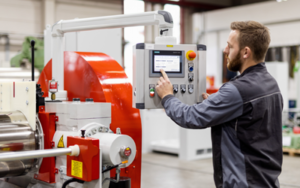DEGUMA efficiency increases the service life of machines by up to 40 years
Geisa, Germany – Maximum efficiency, occupational safety in accordance with the latest standards, and a space-saving design: three essential goals that DEGMUA is pursuing with its new DEGUMA efficiency drive system. The mechanical engineering company from Geisa in Thuringia specializes in the modernization of used mixing mills. DEGUMA efficiency is a new type of drive system that saves up to 30 percent in energy costs compared to conventional standard drives. At the same time, it extends the service life of older machines by up to 40 years.
In all sectors of the industries, the issue of sustainability is increasingly gaining importance. Sustainability is fundamental for society, ecology and economy, and mechanical engineering can also set an important example here. With DEGUMA efficiency, DEGUMA has addressed this issue with the aim of significantly increasing the service life of older machines while at the same time substantially reducing their energy consumption. According to the mixing mill specialist, it is possible to achieve energy cost savings of up to 30 percent. The basis is a new drive system designed by DEGUMA with state-of-the-art technology. Not only is this sustainable, but it also increases the profitability of production in the medium term, as amortization is possible after just five years.
The DEGUMA efficiency concept focuses on equipping machines with torque motors, high-pole permanently excited synchronous direct drives. These drives provide maximum and constant torques even at the lowest speed, while at the same time being extremely cost-effective. In addition to energy efficiency, this concept meets DEGUMA’s demand for comprehensive occupational safety and space-saving design. Users benefit from modern safety PLCs in the mixing mills, based on Siemens S7 components in combination with a large, swiveling Siemens HMI Comfort Panel as well as remote maintenance routers. DEGUMA ensures that the safety guidelines for mixing mills are met according to the currently valid version of EN 1417:2015. The used machines stand out due to their compact design and substantial minimization (approx. 85 percent) of forces introduced into the machine frame.

